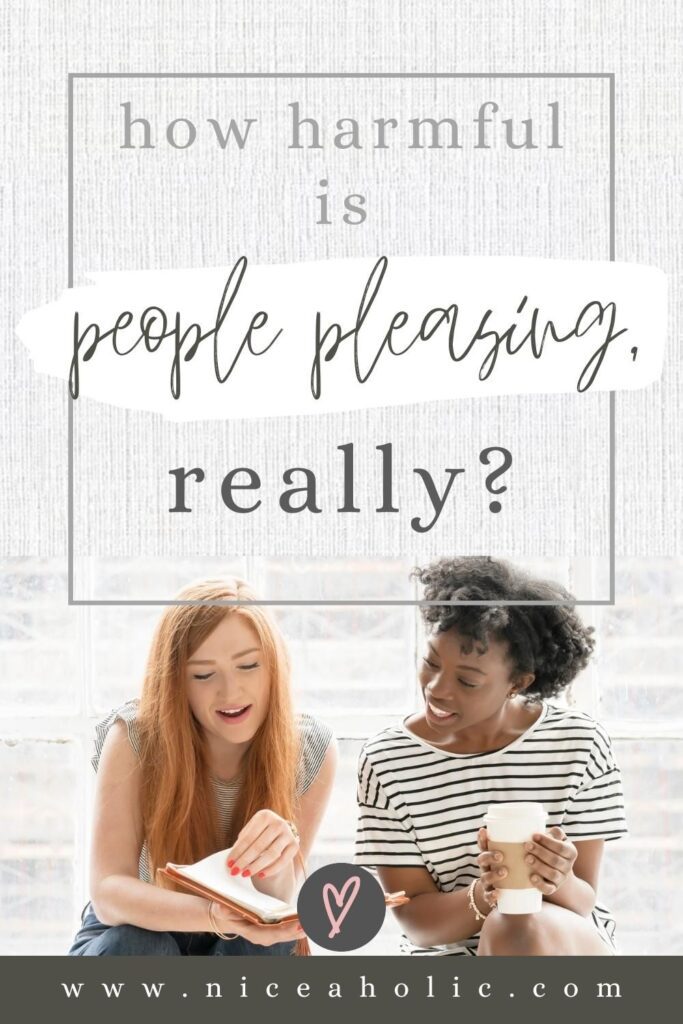How To Stop Feeling Guilty When Setting A Boundary For The First Time

Stop feeling guilty when setting Boundaries the First Time
Are you afraid to start setting boundaries, because you feel guilty saying no to people?
As niceaholics, we would rather set ourselves on fire than set a boundary, because we don’t want to disappoint or hurt others.
However, there is a great cost to ourselves if we shy away from setting boundaries. We can lose ourselves in the service of others, resulting in resentment, burnout, and a feeling of being taken for granted.
The first time we set a boundary will probably be messy, but It’s important to learn how to set boundaries healthily and kindly so that you can maintain quality relationships and live your life free from the control of others.
Why setting boundaries is important for people-pleasers
People pleasers tend to put others’ needs above their own, which can lead to them feeling used, unappreciated, and resentful. Setting boundaries allows you to take care of yourself and sets the expectations for how you should be treated by others.
It can feel mean if you aren’t used to it.
Being assertive compared to when you are usually timid and compliant, is often a big leap and it will feel very strange. But it is so important for nice women to set boundaries because, without them, they will continue to put others’ needs above their own and live a life that is not of their choosing.
Over time this can lead to a feeling of being used and unappreciated, and that you don’t matter, which can be very hurtful.
By setting boundaries, you are teaching people how to interact with you in a way that is kind and respectful for both parties.
Key Elements for Creating Healthy Boundaries
Ok, so you are convinced and need to prepare for setting your first boundary. Try not to be too nervous 🙂
First, we need to address the way we think about boundary setting. Your thoughts create your feelings and if you want to be brave when doing this, you will need to reframe your beliefs around boundary setting.
You know if you truly want to be your best, to have a happy and healthy life, you need to learn how to set boundaries. So, think about boundaries as being clear about what your limits are, instead of you letting someone down.
They are necessary to ensure you don’t get overwhelmed by the demands of the wrong people in your life. When you start saying no you are freeing up time to spend with the right people in your life, who love and appreciate you.
Think of it as a yes to the wrong people is a no to the people who love you, or even worse, a no to yourself.
You have control here. Without boundaries, you are likely to be overburdened, stressed, and resentful, and it’s up to you to set and maintain your limits. You are the only one responsible for your happiness and well-being. No one else can do it for you.
If you find it hard to say no, and it’s affecting your well-being, you need to stop and recalibrate.
Here are some key elements for creating healthy boundaries (without the guilt!):
Know your limits & your values
Knowing yourself is the key to creating and maintaining good boundaries. Know your emotional, mental, and physical limits. Work out what makes you feel uncomfortable or stressed and what feels good.
Reflect on times when you have felt upset about favors you gave, that were unappreciated or even dismissed.
Think about what makes you happy and where you prefer to spend your time, so you know what your priorities are.
Often, we are so focused on making others happy, that we don’t even know what we like to do anymore!
It also helps to know your values and be guided by them when setting boundaries for the first time. If you don’t know your values Dr. De Martini has a quiz you can take on his website.
Learn how to read your feelings
In assessing where your limits are, you will have felt a range of different emotions. Two key emotions that signal that your boundaries are being crossed are resentment and being upset.
You may also feel like you want to cry.
This should be the alarm for you to take notice of what’s going on, and who the intruder is!
Dig down and find out what exactly it is that’s upsetting you. Is it being disrespected? Do you feel pushed around? Are your previous efforts not recognized? Or are you feeling invalidated?
If you feel like a doormat, that’s a clear sign you’re being pushed beyond your boundaries, and it’s time to reassert those boundaries and say no.
Permit yourself to enforce your boundaries
It’s okay to say no. Your self-respect must maintain your boundaries and refuse an unwelcome request. There is no room for guilt or self-doubt in this.
Having clear boundaries and sticking to them is not selfish.
Often the request itself is unreasonable or unfair, so the person asking needs to be seen as a troublemaker and maybe even a danger to you. So do not feel guilty about saying no, because the fact it was asked of you was unfriendly in the first place.
When you put yourself first, you’re ensuring that you will have the energy to do the things you want to do and be there for people when it’s right for you.
Be clear about what’s up for negotiation
Know what you need to stay happy and healthy, whether it’s your daily walk, a gym session, or a yoga practice.
Make it clear that these are non-negotiable parts of your daily schedule.
Similarly, be clear that you won’t host family parties, but you will contribute with food or drinks. Being clear and direct about your boundaries leaves no room for doubt, guilt, or leverage.
Be direct
When you’re clear about your boundaries, you don’t need an excuse, a backstory, or a note from your mother 🙂
Be clear and direct and leave it at that. There’s nothing worse than feeling like you’ve said your piece and the other person completely misunderstands. Ugh!
You can be polite and kind about it, but in the end, it’s okay just to say no and keep your boundaries strong.
How to set a boundary for the first time
So now you have thought through the process and made your plan about where your boundary is. It is time to take action and set your first boundary, guilt free!
It can be really difficult to know how to set a boundary if you’ve never done it before. You’ll probably feel like you will die, but I promise you will come through this alive!
Being brave this one time will be so rewarding, and you will be so proud of yourself when you’ve done it.
Here is a step-by-step guide to help set your first boundary:
- Know your most important values
- Figure out what you need or what you’re uncomfortable with
- Write down why it’s important to you that changes are made now
- Make sure you are calm and aren’t angry or upset
- Communicate your needs or feelings to the other person
- Be assertive and firm in your request
- Listen and respond kindly by repeating your boundary if necessary
- Resist the urge to manage their response and smooth things over
- Don’t feel guilty about setting a boundary; their feelings are their responsibility
- Walk away and give yourself a high five!
- Reflect on how it went and what you can improve on for next time
It can be difficult to set a boundary for the first time, especially if you’re worried about feeling guilty.
However, just remember that setting a boundary is not about being selfish; it’s about taking care of yourself and your own needs. No one else is going to do this for you, it has to be you who takes action.
Follow the steps above to help you get started, and don’t forget to be assertive and firm in your request.
4 Ways to Deal with Guilt When Setting Boundaries For The First Time
So, you’ve worked hard to set boundaries, put yourself first, and practiced saying no.
No, you can’t work late again tonight. No, you can’t drive your teenager to the bus stop. No, you don’t want to go out this weekend. No, you can’t lend them some money.
You set some healthy boundaries, you politely stated your own needs, and you stuck to your guns.
But you don’t feel as good as you thought you would. You feel guilty. You might feel selfish or mean. You might even be tempted to go back to apologize and offer your help.
Then the doubts start. What if that person needed your help? Maybe you shouldn’t have let them down. Maybe you were unreasonable in saying no. Maybe they won’t like you anymore, or you won’t get promoted if you look like a bad team player.
Society places a huge emphasis on sacrificing our own needs for others. As niceaholics, we are programmed to please other people from childhood, and it’s not easy to overcome.
Here are four ways of dealing with ‘boundary guilt’:
Acknowledge the guilt reflex
Accept that maintaining your healthy boundaries is likely to make you feel guilty, at least at first. It’s unusual for you to say no, you’ve never done this before! It’s going to feel weird.
It takes time and practice to build your boundary-setting muscles.
So be kind to yourself and keep moving. See it as a bad habit you don’t need to continue.
It will feel more natural with time but try to be patient during the transition phase.
Look for the yes
If you feel that you’re saying no by setting boundaries, flip it the other way and work out where you’re saying yes.
Maybe you’re on time to pick up the kids or have some much-needed downtime. You may get to spend time with people who nourish and treasure you.
When you do this, you don’t want to be distracted and stressed. It improves your healthy relationships when you put boundaries down with the demanding ones.
As empaths and introverts, we need a lot of time to ourselves to maintain our giving nature. When we have time to reboot, we can give more of ourselves to those who need us.
We are saying yes to our well-being, as we are no good to anyone if we are burnt out and depressed.
Don’t Over-explain
I know you are going to want to over-explain yourself, but it’s not needed and undermines the seriousness of what you are saying.
You can keep it plain and simple when you want to say no. Just say no.
You don’t need an excuse or a rationale. You don’t need to explain why you’re refusing. You also don’t need to apologize.
Be polite and say, ‘no thank you,’ or ‘I can’t.’ Of course, you can soften the refusal by saying “I’m sorry I can’t,” just don’t be tempted into an over-the-top apology that turns into you saying yes because you feel so bad!
Remember why you’re setting boundaries
Keep in mind that you’re setting boundaries not to be mean to other people, but to be kind to yourself.
Weak boundaries don’t do anyone any favors. They give people unreasonable expectations and are a shortcut to you feeling overburdened, stressed, and resentful.
People with stronger boundaries are happier, less stressed, and have better relationships. And wanting that is no reason to feel guilty!
Taking back control of your life is so rewarding, and with practice, you will feel less and less guilty each time.
What happens when you set a boundary for the first time?
When you set a boundary for the first time, it can be an exhilarating experience. You are finally taking back control of your life and putting yourself first.
However, there may be some backlash from the people in your life who are used to having you put them first. It is important to stay strong and stand by your boundaries, even if it means losing some relationships along the way.
Usually, there are two ways it goes, well and not very well 🙁
If it goes well, you will receive respect and care from your friend or partner. They will ask you clarifying questions along the lines of what is and isn’t ok with you, so they know how to respect your wishes.
You will feel heard and see, that your relationship means as much to them as it does to you, and they are prepared to work on it with you.
If it doesn’t go well, you’ll know. You will receive arguments, manipulation, shame, or even name-calling but don’t be afraid.
This will highlight a few things for you; you are either dealing with someone immature or easily offended, and they don’t have the emotional skills to handle negative feedback well.
Or you may see a very extreme response that doesn’t seem warranted for the tone of the conversation, such as raging and intimidation. This indicates you are dealing with a toxic person who is possibly narcissistic and is trying to frighten you into conforming again.
Both of these responses indicate a type of person who is not capable of being in a respectful and kind relationship and is someone you should get as much distance from as you can.
What to do if the other person doesn’t respect your boundary
When you set a boundary for the first time, it can be a bit of a challenge.
You may find that the other person doesn’t react positively to your new boundary and may even become agitated. It’s important to stay strong and not back down from what you’ve said.
Remember, you’re doing this for your health and well-being, and not to please anyone else.
If they do not respect your boundary, it is important to stand firm and remind them of what you have previously agreed upon.
Their response will be quite telling. Are they aggressive with you? Do they argue, dismissing your requests?
It may be helpful to discuss why you need to stick to your boundary. If the other person still does not respect your boundary, it may be necessary to distance yourself from them.
You may lose some of your people and you will grieve their loss, but it will free up space for new friends to fill and you need to let them go.
Some people are only in your life for a season and perhaps your time together in this life, has come to an end and that’s ok.
You have outgrown them and it’s time to move on and choose people who choose you.
Boundary tips for beginners
When you are starting on your boundary-setting journey, it’s helpful to have a few tricks up your sleeve. Here are a few quick tips to help you feel more confident when setting your first boundary.
Start small. Boundaries don’t have to be a big deal. If you haven’t had any experience setting boundaries, try smaller steps to start with. You may want to try sending food back at a restaurant, or not responding to text messages straight away. Think tiny and make it easy for you to have a positive experience, so you’ll do it again.
Work with people you know are ‘easier’ to start with and work up to your more challenging relationships.
Recruit a friend to practice with, I’m sure you’re not the only one who wants to improve boundary setting.
Repeat after me, boundaries aren’t mean, they are an emotional fence I use to protect myself. People who cross them need to know they are out of bounds, so they can adjust course. Those who trespass deliberately do not deserve my kindness.
Don’t take it personally. The way people respond to your request is a reflection of them, not on you. You are going to be kind and gentle when starting, so if people flip out, it’s triggered something for them, and you have no control over that.
Observe and learn, you aren’t going to get it right every time. Especially if you are nervous. Give yourself grace and know it will improve with practice.
A final note
Setting boundaries can be scary at first but it will get easier with practice. Take it slow and keep working on it, even when you mess up.
If you are brave and start being clearer about what is and isn’t ok with you, you will be amazed at how the quality of your relationships improves. Your self-respect strengthens and there is less conflict in your life.
You will have less worry and guilt in your life because you know exactly where you stand and who stands with you :).
I know you can do it, babe, set your first boundary, watch your life change and never look back.
Remember hun, setting boundaries is part of being kind to yourself. Always be kind to yourself first, ok?
Love



Beautiful boundaries
A nice girl’s guide to setting strong boundaries
Get your 13-page guide designed to help you build confidence and say no politely, yet firmly.
Free when you subscribe to my email list as my thank-you gift to you.







2 Comments
Comments are closed.